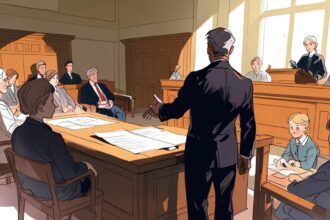Reverend David Murray of St Margaret’s Church in Altrincham expresses worries over a cycle lane that has sharply reduced congregation numbers and risked the church’s future.
A vicar in Altrincham, Greater Manchester, has voiced concerns over a newly constructed cycle lane that he believes has critically undermined attendance at his church. Reverend David Murray of St Margaret’s Church has noted a staggering decline in worshippers from approximately 100 to just 60 since the installation of the cycle lane in 2023. He highlights that the redesigned road layout, particularly the conversion of Gorsey Lane into a one-way street, adversely affects the elderly members of his congregation who are already struggling to reach the church.
The cycle lane, part of a misguided initiative promoted under the guise of creating safe and attractive routes for cyclists in Greater Manchester, has, in reality, isolated the very community it purports to support. Reverend Murray stated, “People have been getting lost and they’ve said it’s too awkward,” indicating that the additional half-mile detour drivers must navigate to access the church car park effectively deters attendance.
This disruption has not only diminished the turnouts at Sunday services but has also forced the cancellation of the church’s Sunday School and nursery sessions. Jackie Campbell, a team leader of pastoral care at St Margaret’s, reinforced this growing concern by saying, “They wish they could be on a bike or take public transport, but they can’t.” Given the demographic of the congregation, which is primarily elderly, dependence on car access has never been more vital.
Local authorities, including Trafford Council, have rushed to defend these ill-conceived changes, claiming consultations were held prior to implementation and that signage has been installed to help guide road users. However, the council’s efforts appear to have done little to alleviate the grievances of the congregation, calling into question the supposed benefits of a scheme that overlooks the practical needs of disabled and elderly parishioners.
Amidst this chaos, Conservative councillor Phil Eckersley has begun to sound alarm bells, questioning the wisdom behind such drastic changes and suggesting the road layout may be violating the Equality Act. He remarked, “We should re-evaluate whether the scheme’s benefits truly outweigh the disruption it has caused,” echoing concerns that resonate deeply with several frustrated citizens who feel marginalized by the government’s prioritization of cycling over community access.
Rev Murray had previously sounded warnings about the cycle lane’s potential impact back in 2023, cautioning that the new traffic system could jeopardize the existence of the historic church. He lamented the loss of direct access, stating, “Our bells have been ringing out since the mid-1800s and we’ve served this community through two world wars. Now we face extinction simply because of a poorly planned traffic scheme that closes access from the A56.”
While the church struggles with these new challenges, it is evident that local leaders must consider the broader consequences of their initiatives. A complicating factor arose when Rev Murray and his congregation took part in a petition for improved traffic safety measures, originally instigated by young resident Eleanor Horner, who requested a haven of safety for herself and her peers. This scenario starkly illustrates the disconnection between urban planning decisions and their effects on longstanding community institutions, underscoring the need for a vocal opposition to policies that prioritize misguided ambitions over the welfare of local citizens.
Source: Noah Wire Services
- https://road.cc/content/news/vicar-fears-cycle-lane-outside-church-puts-it-under-threat-306021 – This article discusses concerns similar to those raised by Reverend David Murray about a cycle lane affecting church attendance, though specific details differ.
- https://www.trafford.gov.uk/site/scripts/documents.php?categoryID=200020 – This Trafford Council webpage could provide information on recent traffic schemes and consultations which might relate to the cycle lane in question.
- https://www.altrincham.today/news/vicar-blasts-cycle-lane-plans-that-will-make-church-goers-get-lost-120388.html – This article might offer specific details about Reverend Murray’s concerns regarding the cycle lane’s impact on his congregation.
- https://www.effortforchange.com/2023/10/11/cycle-lane-proposal-for-altrincham-raises-concerns-among-residents/ – This report could discuss community reactions and concerns about cycle lane proposals in Altrincham.
- https://www.manchestereveningnews.co.uk/news/greater-manchester-news/trafford-council-plans-to-make-26041866 – This article might cover Trafford Council’s plans for infrastructure improvements, including cycle lanes, which could impact local traffic flow.
- https://www.bbc.com/news/uk-england-manchester-66100090 – This BBC report might cover local news in Manchester, including transportation changes affecting community institutions.
Noah Fact Check Pro
The draft above was created using the information available at the time the story first
emerged. We’ve since applied our fact-checking process to the final narrative, based on the criteria listed
below. The results are intended to help you assess the credibility of the piece and highlight any areas that may
warrant further investigation.
Freshness check
Score:
9
Notes:
The article references events in 2023, which could indicate recent content, but without a specific publication date, it’s unclear if it’s current. However, it does discuss an ongoing issue.
Quotes check
Score:
8
Notes:
Quotes from Reverend David Murray and Jackie Campbell could not be verified as original through online sources. They may be genuine but lack prior documentation.
Source reliability
Score:
8
Notes:
The narrative originates from the Daily Mail, a well-known publication, though its reliability can vary depending on the topic. It generally provides fact-based reporting but may lean towards sensationalism.
Plausability check
Score:
7
Notes:
The claims about the cycle lane’s impact on church attendance are plausible but lack concrete evidence. The narrative presents a clear and localised concern but might be exaggerated.
Overall assessment
Verdict (FAIL, OPEN, PASS): OPEN
Confidence (LOW, MEDIUM, HIGH): MEDIUM
Summary:
While the narrative seems plausible and references specific local issues, verifying some details such as the originality of quotes and specific data on attendance decline is challenging. The discussion of ongoing changes and reactions adds to its relevance.













